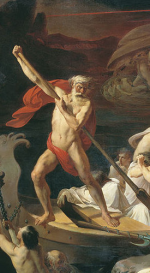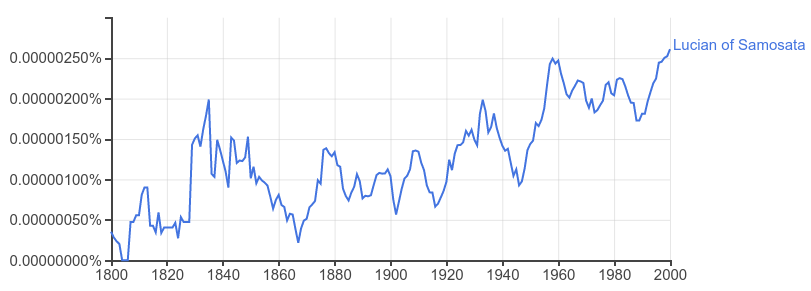Table of Contents
The Lucian of Samosata Project
Momus' objection to Hephaestus' man was this: he should have made a window in the man's chest, so that when it was opened, his thoughts and designs, his truth or falsehood, might have been apparent. - Hermotimus 20
A website dedicated to advancing the writings of Lucian of Samosata
Lucian of Samosata (c. 120 AD - c. 200 AD) was the author of more than 70 known dialogues & treatises and is considered the supreme Ancient Greek satirist. Throughout his writings, Lucian interconnects the stories of gods and men, rich and poor, philosopher and skeptic, tyrant and subject, all with an eye for entertainment and humor. Lucian, an Assyrian by birth, held a strong command over the Greek language and his style harkens back to dialogues by Plato, writings by Attic writers in the Classical Age, and cynical satire by Menippus. With a keen eye to the follies of man and commentary on the universal aspects of human behavior, Lucian left us a treasure trove (Thesaurus) of delightful writings that will challenge and amuse his readers for centuries to come.
Charon: Representative character in many of Lucian's dialogues.
'I thought I should like to see what life is like; what men do with it, and what are these blessings of which they all lament the loss when they come down to us.'
Why read Lucian?
- Lucian was a man of the world: Lucian was not involved in metaphysical speculation or purely academic pursuits. Lucian was far from being a dogmatist - in fact, his works can be seen as a repudiation of dogmatism. As we would say today, Lucian was proudly “down-to-earth”. While practicing rhetoric throughout the Roman World, he gave presentations of his works, reaching out for for a receptive audience. His writings were not meant for a select few followers; on the contrary, his works were presented in the open for every man to hear. Always in-tune with his surroundings, Lucian saw society with a practical yet ironic stance. See Dipsas, Menippus, & The Dependent Scholar
- Lucian had a strong, idiosyncratic sense of humor: Lucian liked to lampoon just about everyone, from drunken philosophers to fame-seekers to the very gods themselves. Lucian wrote for people who hold nothing as sacred. His writings touch all aspects of the world (but with a twist). See The Parasite, The Rooster, & Zeus Tragoedus
- Lucian was an erudite individual, schooled in the principles of his time: Lucian's pages are teeming with references to all sorts of characters ranging from Zeus to, for example, Brasidas, a Spartan general from the first half of the Peloponessian War. Both large and small characters, fictional and real, vie for attention on his pages. For anyone with the faintest classical education, Lucian provides profound classical depth to his writings, making him a joy to read. The best and often the most well known stances of classical authors can be found in his writings. See Charon, Timon the Misanthrope, & Dialogues of the Gods
- Lucian praised common sense and sensible living: For all the laughs, all readers of Lucian are struck by his ethical stances on important issues that transcend the centuries. More often then not they appeal to the common sense notions residing in us all. Lucian uses his satire as a way to cut through the fog and illusion to find the most logical and practical path. See Alexander, The Death of Peregrine, & Nigrinus
- Lucian was skeptical and attempted to dispel clouded thinking: Lucian taught us to look beyond appearances to the see the exposed reality. In the cloudiness of our current reality, it is easy to see how lies can become truth and truth become lies. Surely like Menippus, Lucian liked to show how our preconceptions and ideas about things, people, and events are sometimes not what they appear to be. Menippus would say (echoing Diogenes) that we live in a state of tuphos. We often cannot see the entire picture and we make judgments based on partial input. Lucian challenged us to see the world rightly and not get caught up in conspiracies, lies, and obfuscation. See Hermotimus, The True History, & The Liar
- Lucian's writings record aspects of the Classical World that would have otherwise been lost: The range of Lucian's interests and the quality content that has survived from him is astonishing. He makes one of the first references to the Christians; Lucian mentions texts that have been lost to history; Lucian wrote about practices and beliefs that either have no other parallels or are more in-depth than other sources; Lucian wrote about alternate histories and stories that differed from the traditional; Lucian gives us greater insight into pagan religion and practices; Lucian provides an excellent look into classical philosophy without delving too far into actual discourses, proofs, and axioms.See Prometheus On Caucasus, Sale of Creeds, Heracles, & Remarks Of an Illiterate Book Fancier.
Who was Lucian? - Biographical Profile of Lucian of Samosata
Solid Evidence
- Lived from around 120 AD to 200 AD
- Of Syrian (or Assyrian) ethnicity
- Born at Samosata on the Euphrates (in the old Kingdom of Commagene)
- Lived under multiple Roman Emperors: Antoninus Pius, Marcus Aurelius, Lucius Verus (co-emperor with Marcus Aurelius), Commodus, and perhaps Pertinax
- Wrote using the Attic prose of the 5th and 4th centuries BC
Evidence from Lucian's Writings
- Visited or lived in: Samosata, Ionia, Greece, Italy, Gaul (modern France), Athens, Rome, & Egypt
- Before setting out in a career as a rhetorician, Lucian trained with his uncle to become a sculpter
Other Evidence
- Hellenic culture influenced Lucian from an early age due to existing Greek traditions in the Middle East
- Lifetime overlapped with the Second Sophistic, which may have influenced Lucian's emphasis on rhetoric
- Lucian may have spoken Aramaic as a first language
Read the Complete Works of Lucian with Table of Contents
Read Lucian in Greek (Download PDF)
Luciani Samosatensis Opera - Ad Optimorum Librorum Fidem. Tauchnitz, 1829. Digitized by Google: 08/29/07.
Featured Adjuncts
- Cyrenaics Resource: Only place online to find the majority of references and writings of the Cyrenaics, the ancient hedonists.
- Cynic Lives and Writings: A comprehensive library of references to Cynic teachings and persons.
- Demonax - Hellenic Library: Comprehensive online resource with almost all Greek writings from antiquity.
- Lucian Blog: Links, articles, and images of interest to the developer of lucianofsamosata.info
- Lucian Wiki: Essays and entries on sundry topics.
- Vico Ricorso: Library of reblogs for the philosopher Giambattista Vico
- Phalaris - The Source Material: Phalaris is a colorful character mentioned in Lucian who was best known for his exquisite torture device, the Brazen Bull.
Lucian Ngram: 1800 - 2000
Everything you would need to know about an Ngram is found at this LINK.
The brief explanation is that it represents the percentage of books that are topically related to the search terms. It's so much more, but that's the brief answer.
* Readings below by year:
- 1800 - 0.0000003532%
- 1820 - 0.0000004051%
- 1840 - 0.0000012342%
- 1860 - 0.0000008093%
- 1880 - 0.0000013365%
- 1900 - 0.0000010402%
- 1920 - 0.0000009700%
- 1940 - 0.0000014185%
- 1960 - 0.0000024709%
- 1980 - 0.0000020414%
- 2000 - 0.0000026114%
- Overall, a 639.35% increase from 1800 to 2000.
Photius, an ancient commentator: thoughts on Lucian
Read Lucian's declamation On Phalaris and his various Dialogues of the Dead and Courtesans, and other works on different subjects, in nearly all of which he ridicules, the ideas of the heathen. Thus he attacks their silly errors in the invention of gods; their brutal and ungovernable passions and lack of restraint; the monstrous fancies and fictions of their poets; their consequent errors in statesmanship; the irregular course and changes and chances of their life; the boastful behaviour of the philosophers, full of nothing but pretence and idle opinions; in a word, his aim is, as we have said, to hold up the heathen to ridicule in prose. He seems to be one of those persons who regard nothing seriously; ridiculing and mocking at the opinions of others, he does not state what opinions he himself holds, unless we may say that his opinion is that one can know nothing for certain. His style is excellent, his diction clear, suitable and expressive; he shows a special liking for distinctness and purity united with brilliancy and appropriate dignity. His composition is so well fitted together that the reader does not seem to be reading prose, but an agreeable song, whose nature is not too obtrusive, seems to drop into the listener's ears. In a word, as already said, his style is charming, but not in keeping with the subjects which he himself has determined to ridicule. That he was one of those who held that nothing could be known for certain is shown by the following inscription in the work:
“I, Lucian, wrote this, I who am skilled in what is old and foolish;
For what men think wise is foolish.
So then nothing that the mind of man can conceive is certain;
What you admire, seems ridiculous to others.”
Flowing Praise of Wieland
His shining qualities are certainly not without blemishes; neither the man nor the author are entirely blameless: who will pretend to deny it, or attempt to justify him in all respects? A head so clear and cool might easily, by his natural abhorrence of everything that bore the appearance of fanaticism, in some cases be led farther than many good people would be inclined to follow him. Such a lively and spirited wit, in the gaiety of his heart, may likewise be betrayed into a dry jest, and a partial judgment; or a too keen rebuke may be apt to slip out. An author of the second century, when good taste was beginning to give way to a passion for being new and original, when the elegant diction of the ancients was beginning to be superseded by a cramped, starched and quaint neological style, overloaded with artificial flowers and frippery, must, notwithstanding his nice tact in the true and beautiful, and with all his earnest endeavors to form himself by the most perfect models of better times, here and there have a dash of the present. All the three cases are sometimes, though but seldom, applicable to our author: but these spots are obliterated by so many substantial beauties and merits, that they come into no consideration. Indeed I know not which of all the old writers can be brought in competition with him for fertility of genius, for a union of the several species of ingenuity, for wit, humor, taste and elegance, for the talent of conferring the grace of novelty on the most common and familiar topics, and for combining all these means of pleasing, with a sound judgment, the most diversified and agreeable branches of knowledge, and with all that polish which a happy constitution of nature, nursed by the muses, can only acquire in the great world and in the conversation of select characters. Though it is not to be denied, that after a lapse of seventeen hundred years, from the alterations that have ensued in customs and manners, in religion and the whole constitution of society, from the advantages which in some respects we have over them, brought on by fortunate conjunctures, the progress of culture, extension of science, and other contingencies, his modern readers must lose not a little : yet as after deducting this loss, so much still remains ; since, notwithstanding so many disadvantages, he has always entertainment and charms for almost every kind of reader ; since, after so great an interval of time, his humor is still diverting, his satire still applicable, his pictures of manners still fresh and vivid, his raillery, in general, still fine and agreeable, and (what is not the least surprising) even his inventions so often copied and imitated by modern writers ; since, familiarized therefore as we are with them, they always retain such an air of originality, such an appropriate action and character, we are enabled to imagine the effects they must have produced upon the people of his time, and how much he must have delighted and enchanted the Greeks, who were so extremely sensible to the charms of genius, and particularly to the siren-strains of wit and eloquence.
Zeitgeist | Page Ranking
Ranking based on number of visitors to each page
Visit to read texts: Texts and Library
- The True History
- The Way to Write History
- Dialogues of the Gods
- Phalaris, I
- Dialogues of the Dead
- The Death of Peregrine
- Dialogues of the Hetaerae
- Timon the Misanthrope
- Nigrinus
- Life of Demonax
- Menippus
- The Vision
- Herodotus and Aetion
- A Literary Prometheus
- Dialogues of the Sea-Gods
- The Liar
- Hermotimus, or the Rival Philosophies
- The Syrian Goddess
- Of Pantomime
- Saturnalia
- Zeuxis and Antiochus
- Anacharsis, a Discussion of Physical Training
- Sale of Creeds
- Toxaris: A Dialogue of Friendship
- A Feast of Lapithae
- Slander, a Warning
- Trial in the Court of Vowels
- Alexander the Oracle-Monger
- Charon
- Zeus Cross-Examined
- The Cynic
- The Fly, an Appreciation
- Cronosolon
- Heracles, an Introductory Lecture
- Phalaris, II
- Prometheus on Caucasus
- The Dependent Scholar
- The Fisher
- Remarks Addressed to an Illiterate Book-Fancier
- Voyage to the Lower World
- The Double Indictment
- The Rhetorician's Vade Mecum
- Zeus Tragoedus
- A Slip of the Tongue in Salutation
- Saturnalian Letters
- The Parasite, a Demonstration that Sponging is a Profession
- The Scythian
- A Portrait-Study
- The Rooster
- Of Mourning
- A Word with Hesiod
- Dionysus, an Introductory Lecture
- Lexiphanes
- Patriotism
- The Hall
- The Runaways
- Icaromenippus, an Aerial Expedition
- Of Sacrifice
- The Purist Purized
- The Ship: Or, the Wishes
- The Tyrannicide
- Toxaris: A Dialogue of Friendship
- Dipsas, the Thirst-Snake
- Swans and Amber
- Demosthenes
- Harmonides
- The Disinherited
- Defence of the 'Portrait-Study'
- The Gods in Council
- Apology for 'The Dependent Scholar'
Licensing
- Text captions from Wikipedia (Creative Commons Attribution-ShareAlike License)
- Hosting powered by CentOS Linux (GNU General Public License)
- Lucian Wiki powered by Dokuwiki (GNU General Public License Version 2)
- Lucian Blog powered by WordPress.org (GNU General Public License Version 2)
 To the extent possible under law, the webmaster, F. Redmond, has waived all copyright and related or neighboring rights to The Lucian of Samosata Project. This work is published from: United States.
To the extent possible under law, the webmaster, F. Redmond, has waived all copyright and related or neighboring rights to The Lucian of Samosata Project. This work is published from: United States.- The Lucian Wiki and Lucian Blog have separate licensing.



